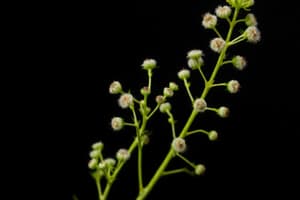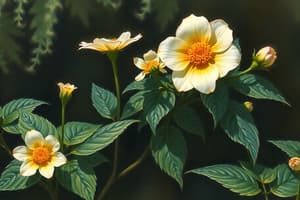Podcast
Questions and Answers
Who is known as the father of genetics for his study of inheritance in pea plants?
Who is known as the father of genetics for his study of inheritance in pea plants?
- Augustin Stahl
- Gregor Johann Mendel (correct)
- Richard Spruce
- George Ledyard Stebbins, Jr.
Which of the following individuals is recognized as the father of Botany?
Which of the following individuals is recognized as the father of Botany?
- Leonardo da Vinci
- Charles Darwin
- Robert Brown
- Theophrastus (correct)
Which scientist is widely regarded as one of the leading evolutionary biologists of the 20th century?
Which scientist is widely regarded as one of the leading evolutionary biologists of the 20th century?
- Carlos Muñoz Pizarro
- Claudius Galen
- George Ledyard Stebbins, Jr. (correct)
- Robert Hooke
Which figure is known for detailed studies of Amazon flora?
Which figure is known for detailed studies of Amazon flora?
Who is identified as the father of evolution?
Who is identified as the father of evolution?
What does the term 'Botany' primarily refer to?
What does the term 'Botany' primarily refer to?
Who is considered the first scientist to influence Western philosophy and scientific culture?
Who is considered the first scientist to influence Western philosophy and scientific culture?
What significant contribution did Theophrastus make to the field of botany?
What significant contribution did Theophrastus make to the field of botany?
What is the primary focus of the scientific method as described in the content?
What is the primary focus of the scientific method as described in the content?
Which of the following individuals is credited with defining the scientific method?
Which of the following individuals is credited with defining the scientific method?
During which time period did the study of botany experience stagnation?
During which time period did the study of botany experience stagnation?
What is one of the earliest focuses of botany as a field of study?
What is one of the earliest focuses of botany as a field of study?
Which naturalist is known for the oldest surviving botanical work?
Which naturalist is known for the oldest surviving botanical work?
Who laid the foundation for the modern scheme of Binomial nomenclature?
Who laid the foundation for the modern scheme of Binomial nomenclature?
Which process involves the study of the interactions between organisms and their environment as referenced in botany?
Which process involves the study of the interactions between organisms and their environment as referenced in botany?
What significant discovery related to a pigment in plants occurred in the early 19th century?
What significant discovery related to a pigment in plants occurred in the early 19th century?
Which scientist is known for the concept of 'Nature's War' that influenced Charles Darwin?
Which scientist is known for the concept of 'Nature's War' that influenced Charles Darwin?
Which branch of botany focuses specifically on the study of fungi?
Which branch of botany focuses specifically on the study of fungi?
What is one of the fundamental benefits of botany concerning the environmental impacts?
What is one of the fundamental benefits of botany concerning the environmental impacts?
In the context of botanical history, what did Joseph Priestly contribute to the study of plants?
In the context of botanical history, what did Joseph Priestly contribute to the study of plants?
Which of the following best describes the focus of economic botany?
Which of the following best describes the focus of economic botany?
Flashcards
Botany
Botany
The scientific study of plants, including their structure, growth, reproduction, and evolution.
Aristotle's Contribution
Aristotle's Contribution
Aristotle, a Greek philosopher, pioneered techniques of logic, observation, and inquiry, influencing Western science and philosophy.
Scientific Method
Scientific Method
A systematic process used to explore observations and answer questions through experimentation and analysis.
Theophrastus's Legacy
Theophrastus's Legacy
Signup and view all the flashcards
Dioscorides
Dioscorides
Signup and view all the flashcards
Johannes van Helmont
Johannes van Helmont
Signup and view all the flashcards
Robert Hooke
Robert Hooke
Signup and view all the flashcards
Anton van Leeuwenhoek
Anton van Leeuwenhoek
Signup and view all the flashcards
Father of Taxonomy
Father of Taxonomy
Signup and view all the flashcards
Father of Genetics
Father of Genetics
Signup and view all the flashcards
Father of Botany
Father of Botany
Signup and view all the flashcards
Modern Plant Evolution
Modern Plant Evolution
Signup and view all the flashcards
Who discovered cells?
Who discovered cells?
Signup and view all the flashcards
Joseph Priestley's Discovery
Joseph Priestley's Discovery
Signup and view all the flashcards
Chlorophyll: Function
Chlorophyll: Function
Signup and view all the flashcards
Photosynthesis: Definition
Photosynthesis: Definition
Signup and view all the flashcards
Charles Darwin's Impact
Charles Darwin's Impact
Signup and view all the flashcards
Gregor Mendel's Contribution
Gregor Mendel's Contribution
Signup and view all the flashcards
Plant Ecology
Plant Ecology
Signup and view all the flashcards
Plant Anatomy & Morphology
Plant Anatomy & Morphology
Signup and view all the flashcards
Economic Botany
Economic Botany
Signup and view all the flashcards
Study Notes
Introduction to Pharmaceutical Botany with Taxonomy
- The study of plants, algae, and fungi for pharmaceutical purposes
- Focuses on the scientific study of plant life, including structure, growth, reproduction, metabolism, development, diseases, chemical properties, and evolutionary relationships between taxonomic groups.
Basic Concepts to Understand Plants
- Botany: derived from the Greek word "botane," meaning herb or plant
- Botany is the scientific study of plants
- Plants encompass a diverse range of organisms, from bacteria to the largest living things
Botany
- A branch of biology focusing on plant life
- Covers various scientific disciplines related to plant life
- Includes the study of plant structure, growth, reproduction, metabolism, development, diseases, and evolutionary relationships among plant groups.
- Originated from early human efforts to identify plants for food, medicine, and other uses
Aristotle (384-322 BC)
- Considered the first scientist
- Pioneered techniques of logic, observation, inquiry, and demonstration
- Influenced Western philosophy and scientific culture
- Utilized a photo-scientific method, involving meticulous observations across various subjects.
Sir Francis Bacon (1561-1626)
- Credited with defining the scientific method
- Considered the "Father of the Modern Scientific Method"
Scientific Method
- A systematic process for experimentation and exploration
- Involves observation, questioning, hypothesis formation, experimentation, analysis of results, and drawing conclusions
Theophrastus
- A Greek naturalist
- Compiled a list of 500 plants, along with descriptions
- His work, Historia Plantarum, is a significant early contribution to botanical studies. This is considered the oldest experience in botanical work
History of Botany (Pre-17th Century)
- 4th century BCE: Aristotle and Theophrastus, foundational figures in the study of plants
- A.D. 60: Dioscorides, a Greek physician, wrote influential works on medicinal plants
History of Botany (During 17th Century)
- Early 17th-century botany, experienced a period of stagnation
- Key figures in the 17th century include: Johannes van Helmont, Robert Hooke, Anton van Leeuwenhoek, and John Ray
History of Botany (During 17th Century) - Continued
- 1727: Stephen Hales
- 1758: Carolus Linnaeus
- 1760: Widespread practice of botany
History of Botany (Later Part of 18th Century)
- 1700s: Joseph Priestly laid the groundwork for chemical analysis of plant metabolism
History of Botany (Early Part of 19th Century)
- 1818: Chlorophyll discovered
- 1840: Study of plants
- 1847: Photosynthesis
- 1859: Charles Darwin
- 1862/1865: Gregor Mendel
History of Botany (20th Century Up to Present)
- Early 20th century: Nitrogen fixation and nitrification
- 1903: Two types of chlorophyll
- 1936: Alexander Oparin
- 1940: Ecology
Branches of Science Involved in Botany
- Agronomy
- Bryology
- Economic Botany
- Ethnobotany
- Forestry
- Horticulture
- Lichenology
- Paleobotany
- Palynology
- Phycology
- Phytochemistry
- Phytopathalogy
- Plant Anatomy
- Plant Ecology
- Plant Genetics
- Plant Morphology
- Plant Physiology
- Plant Systematics
Importance of Botany
- Essential for human and other life forms due to the provision of oxygen, food, fibers, fuels, and medicine.
- Supports ecological balance by preventing soil erosion and influencing the water cycle.
- A crucial aspect for food production for increasing global populations.
- Fundamental to the understanding of life processes and has facilitated developments in treating diseases.
- Important for understanding and predicting environmental changes.
Botanist/Scientist Involved in the Study of Plants
- Luther Burbank (1849-1926): American botanist, horticulturist, pioneer in agricultural science
- Augustin Pyramus de Candolle (1778-1841): Originated the idea of "Nature's War" which influenced Charles Darwin
- David Douglas (1799-1834): Scottish botanical explorer, who imported many ornamental plants into Europe
- Pedanius Dioscorides: Physician, pharmacologist, toxicologist, and botanist, author of De Materia Medica
Botanist/Scientist - Continued
- Carl Linnaeus (1707-1778): Swedish botanist, physician, and zoologist, known for the foundations of the modern system of binomial nomenclature, father of modern taxonomy, and one of the fathers of modern ecology
- Gregor Johann Mendel (1822-1884): Augustinian priest and scientist, known for research on inheritance of traits in pea plants
- Carlos Muñoz Pizarro (1913-1976): Chilean botanist, known for studies of the Chilean flora and its conservation
- Richard Spruce (1817-1893): English botanist and explorer, known for detailed study of the Amazonian flora
- Augustin Stahl (1842-1917): Conducted investigations and experiments in the fields of ethnology and zoology in the Caribbean region
- George Ledyard Stebbins, Jr. (1906-2000): Regarded as a leading evolutionary biologist of the 20th century, developed a comprehensive synthesis of plant evolution which included genetics.
- Theophrastus: Father of Botany, established botanical science through his lectures (Enquiry into Plants), and wrote Historia Plantarum
- Leonardo da Vinci (1452-1519): Italian polymath, scientist, mathematician, inventor, chemist, painter, sculptor , architect , botanist, musician, and writer.
- Robert Brown: Used the microscope to study plants, especially Angiosperms and gymnosperms, also studied pollination.
- Charles Darwin: Father of evolution
- Robert Hooke: Scientist/inventor who discovered cells.
- Claudius Galen: Physician and anatomist
Studying That Suits You
Use AI to generate personalized quizzes and flashcards to suit your learning preferences.




